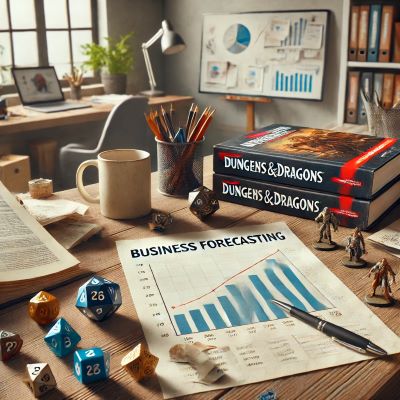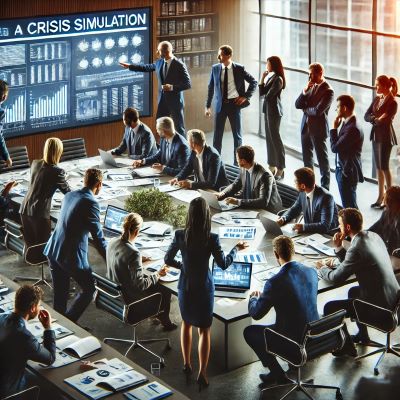Roleplaying games (RPGs) have long been a haven for storytelling, strategic thinking, and escapism. But beneath the layers of dice rolls and character sheets lies an opportunity for deeper engagement—the moral dilemma. I love these conundrums in my games, both as a player and DM. These moments of ethical uncertainty transform a game from a casual pastime into an unforgettable experience. The same is true in leadership training, where presenting trainees with morally complex scenarios forces them to grapple with the consequences of their decisions. They also take trainees away from the black and white course content to the grey examples of real life. In both cases, moral dilemmas create engagement and challenge in ways that are uniquely impactful.
The Core of a Moral Dilemma
A good moral dilemma places players in situations where every choice carries significant consequences. In RPGs, these moments can range from choosing between saving a village or preserving an ally’s life, to deciding whether to betray a trusted NPC for personal gain. In leadership training, dilemmas often revolve around issues like resource allocation, interpersonal conflict, competing stakeholder outcomes, or the balance between individual and organizational values and goals.
The key is that there are no “right” answers. Instead, players or trainees must weigh their values, priorities, and the potential fallout of their decisions, creating a tension that lingers long after the choice is made.
Why a Moral Dilemma Enhances Engagement
- Emotional Investment
When faced with a moral dilemma, players become emotionally invested in the story. They’re no longer just rolling dice or following a script; they’re making deeply personal choices that define their characters—or their leadership style. This emotional engagement ensures that the experience feels both meaningful and memorable. - Immersive Storytelling
A moral dilemma forces players to think beyond scenario mechanics and immerse themselves in the narrative. Instead of focusing on optimization, they start asking, “What would my character do?” or “What kind of leader do I want to be?” This leads to richer storytelling and more profound connections between players and their roles. - Collaboration and Conflict
In both RPGs and leadership scenarios, dilemmas can lead to heated discussions among team members. Differing values and priorities come to the forefront, sparking debates that can either strengthen the group’s bonds or test its resilience. These moments of collaboration or conflict mimic real-world dynamics, making the experience feel authentic. - Growth Through Challenge
Struggling with tough decisions builds resilience and critical thinking. In RPGs, players learn to accept the consequences of their actions and adapt to the evolving story. In leadership training, participants develop decision-making skills and gain insights into their own values and ethics.

Crafting Effective Moral Dilemmas
To create a compelling moral dilemma in either a D&D adventure or a leadership training module, consider the following:
- High Stakes
The decision should matter. Players should feel that their choice will significantly impact the game world or the people around them. - Ambiguity
Avoid clear-cut solutions. Each option should have both positive and negative outcomes, forcing players to wrestle with uncertainty. - Relevance
Tailor the dilemma to the characters’ or trainees’ goals and values. The more personal the choice feels, the more impactful it will be. - Lasting Consequences
Decisions should ripple through the story. Whether it’s a betrayed ally seeking revenge or a workforce demoralized by a tough call, consequences make choices feel real and meaningful.
Bringing It All Together
Imagine a leadership training session where participants roleplay the leaders of a company facing a crisis. A natural disaster has struck, and resources are limited. They must decide whether to prioritize aid for employees or allocate resources to the wider community. Each choice has implications for morale, public relations, and long-term stability. The discussions and debates that follow are rich with insights into team dynamics and individual values.
Similarly, in an RPG, the adventuring party might stumble upon a town cursed by a powerful artifact. Destroying the artifact will save the town but doom the adventurers’ quest to stop a greater evil. Do they sacrifice their mission to save innocent lives, or press on and let the town perish? These choices push players to think deeply about their characters and their place in the story.
Final Thoughts
Moral dilemmas are more than just storytelling tools; they’re catalysts for growth and engagement. Whether you’re running an RPG or designing a leadership workshop, introducing ethical challenges forces participants to think critically, act decisively, and reflect deeply on their values. The result is an experience that’s not just engaging but transformative—one that players and trainees alike will carry with them long after the session ends.
So, the next time you’re crafting an encounter or a scenario, don’t shy away from the grey areas. Embrace the complexity, and watch your players or trainees rise to the challenge.



